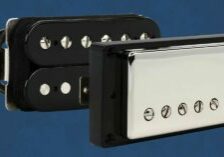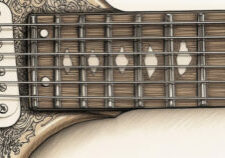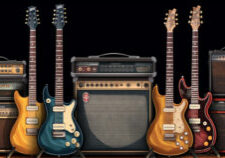Have you ever found yourself standing in a guitar shop, surrounded by row after row of beautiful instruments, and wondered, ‘How many guitars is too many?’ Well, my friend, you’re not alone.
We are going to delve into the depths of this age-old question. We’ll discuss why some guitarists opt for multiple instruments while others argue that one guitar is enough. And we’ll talk a bit about the real disease every guitarist deals with: Guitar Acquisition Syndrome (GAS).
This can be helpful for a few reasons:
- Just to know that you aren’t crazy for having a lot of guitars
- Keeping yourself from buying too many guitars (if you don’t want to).
- Give your wife or girlfriend this important information so they stop yelling at you for constantly buying guitars.
Think of your guitar collection as a diverse group of friends, each with their own unique personality and strengths. Just as you wouldn’t want to limit your friendships to just one person, you may also want to expand your guitar family. But where do you draw the line? How many guitars is too many?
Key Takeaways
- Owning multiple guitars can have benefits such as covering different styles, tunings, or backups, but it can also lead to lack of familiarity and frustration when switching between guitars.
- The number of guitars needed depends on individual circumstances such as playing style, music preference, frequency of playing, gigging needs, goals and budget.
- Quality is more important than quantity when it comes to guitars, and having one good guitar can be enough to be a happy guitarist.
- Guitar Acquisition Syndrome (GAS) is a real phenomenon, and it’s important to find a balance between wants and needs when purchasing guitars, considering factors like space, time, and money for maintenance.
How Many Guitars is Too Many?
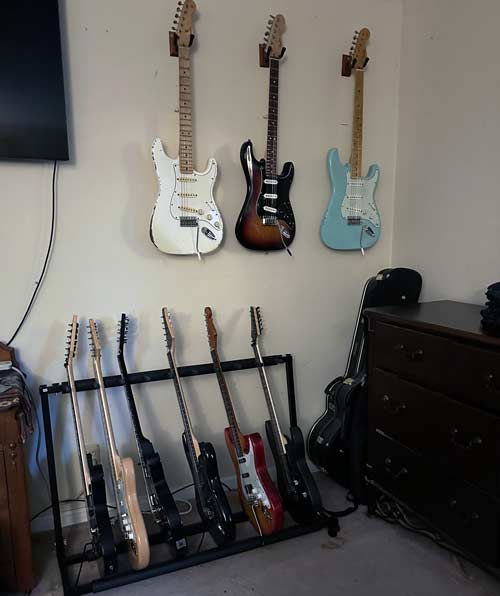
Some of the guitars I keep in my bedroom
The answer to this question depends on your playing style, music preference, and frequency of playing. There is no one-size-fits-all answer to this question, as it ultimately comes down to personal preference and individual circumstances.
For beginners, starting with one or two guitars is typically sufficient. As you progress and become more experienced, you may find that you require additional guitars to suit different playing styles or genres. Intermediate players may be satisfied with three guitars: a classical, an acoustic, and an electric. However, experienced players may need even more guitars to meet their diverse musical needs.
Gigging musicians, for example, usually need four or five guitars to accommodate different gigs and song requirements. On the other hand, collectors can have as many guitars as they desire, as collecting is a personal choice and hobby.
Determining when there are too many guitars also depends on your individual circumstances. Factors such as space, time, and money for maintenance should be taken into consideration. Find a balance between your wants and needs when purchasing guitars.
Ultimately, the number of guitars you need is subjective and should align with your goals and budget. While it’s tempting to acquire a large collection, quality is more important than quantity when it comes to guitars in most cases. There are some reasons to own lower quality guitars and we’ll get into that below.
Factors to Consider
When determining the ideal number of guitars for your collection, you’ll want to take into account a variety of factors.
Playing Style / Music Preference
Different styles of music may require different types of guitars. You might like playing a mix of acoustic guitar songs and electric guitar songs. I enjoy a wide range of music that includes: 70’s classic rock, 80’s hard rock, blues, and heavy metal.
Frequency of Playing
One or two guitars may be sufficient if you’re a beginner or casual player. However, as you progress and become more serious about your playing, you may need additional guitars to meet your evolving needs.
Professional Gigs
If you’re a gigging musician, the number of guitars you need may depend on the types of gigs you play. Different venues and musical genres may require different guitars, so it’s important to have a variety of options available. Also, if you gig, you will need a backup guitar. Lastly, it’s very common to have several guitars for different tunings that are ready to go, so you don’t need to retune the same guitar every time you change songs.
Others Considerations
Space, time, and money for maintenance are also important. Owning multiple guitars requires adequate storage space and regular maintenance to keep them in good condition. Eveyr player will need to assess whether they have the resources to properly care for and maintain multiple guitars.
Beginner Guitarists – One Guitar is Ideal
As a beginner, you don’t need to rush into owning multiple guitars. In fact, starting with just one guitar is often the best choice. It allows you to focus on developing your skills and getting comfortable with the instrument.
Having one guitar as a beginner provides consistency and familiarity, which can greatly aid in your learning process. You can become more attuned to the instrument, learning its nuances and quirks. This deep level of understanding will contribute to your overall improvement as a guitarist.
Moreover, owning one guitar means you can invest your time and resources into mastering that instrument. You won’t be distracted by switching between different guitars or constantly trying to adapt to new sounds and feels. Instead, you can focus on honing your technique and musicality.
Intermediate Guitarists
As an intermediate guitarist, you’ll feel like a rockstar when you have the perfect guitar that resonates with your unique style and brings out your true musical potential. At this stage, you’ve likely gained some experience and have a clearer understanding of your preferences.
While one guitar may have sufficed in the beginner stage, you may now find yourself wanting to explore different genres and experiment with different sounds. This is where having multiple guitars can truly enhance your playing experience. Often 3 to 5 guitars is ideal.
You may want different types of guitar such a classical, an acoustic, and an electric. This can provide you with a versatile range of options.
Alternatively, you may want several electric guitars. After I played several years, I had a BC Rich with two high output humbuckers that I played for hard rock, but I still had a strat I liked to use for blues tones. Then I pickup up a cheap guitar that I used for alternative tunings. I eventually got a guitar I just used with heavy strings and open tunings for playing slide guitar. .
Experienced Guitarists
When you’ve reached the level of an experienced guitarist, you’ll know the joy of owning a collection of guitars that perfectly cater to your musical journey. At this stage, you have developed a deep understanding of your playing style, music preferences, and the specific needs of your performances.
As an experienced guitarist, you may find that one or two guitars are no longer sufficient to meet your artistic requirements.
Having multiple guitars as an experienced player allows you to explore different music genres and styles with ease. It enables you to switch seamlessly between acoustic, electric, and classical guitars, depending on the mood and sound you want to create. Additionally, owning multiple guitars provides backup options during live performances, ensuring that you can continue to play even if one guitar malfunctions.
A lot of professional guitarists that I know that primarily gig with an electric guitar will end up owning multiple acoustic guitars with different tunings. They tend to use these guitars when songwriting.
Guitar Collectors
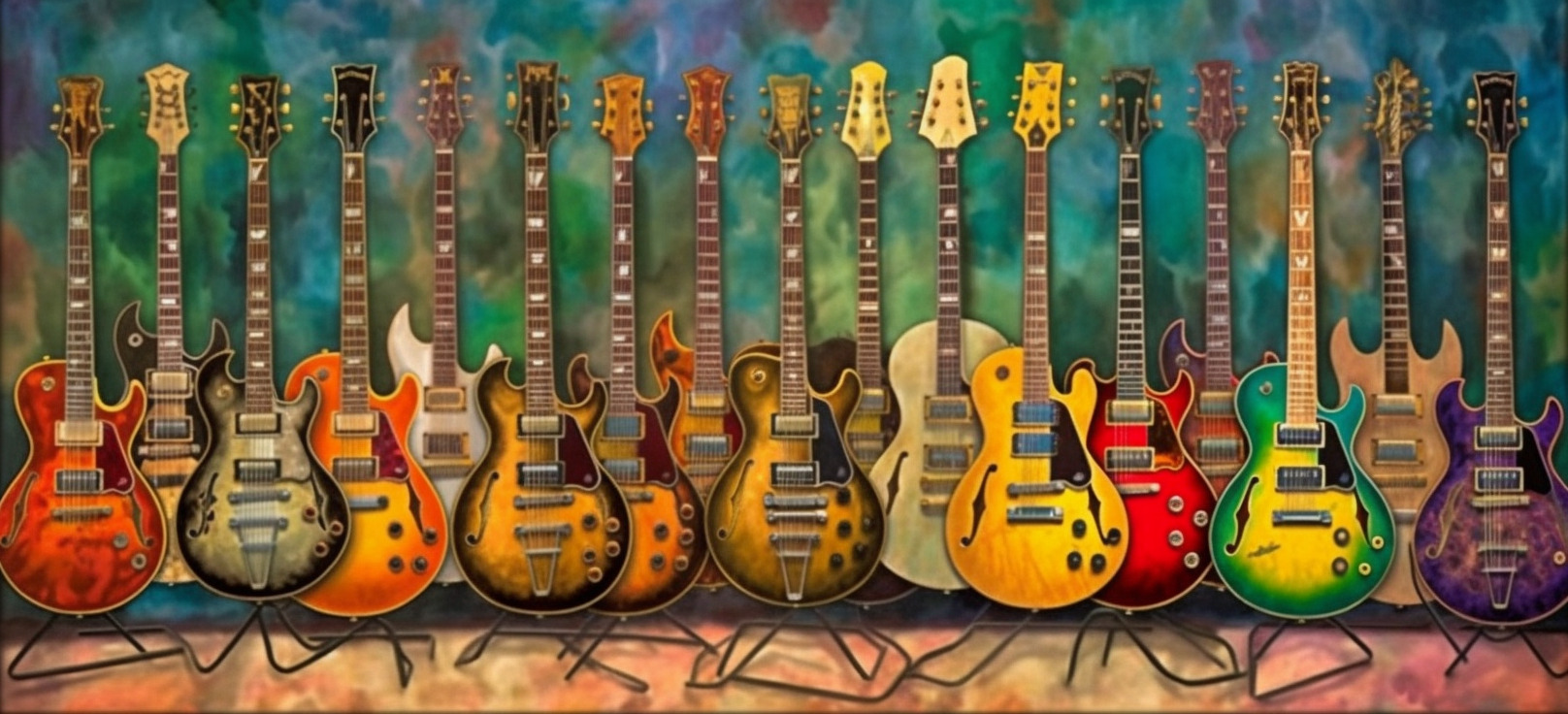
guitar collection on stands
Now let’s shift our focus to another group of guitar enthusiasts: guitar collectors. These individuals have a deep passion for collecting guitars and often have an extensive collection.
Guitar collectors view their guitars as prized possessions, and each one holds a special place in their hearts. They derive great joy from the process of acquiring new guitars and take pride in owning unique and rare pieces.
For guitar collectors, the number of guitars they own is not dictated by necessity or practicality, but rather by their personal desire to build a diverse and impressive collection. They appreciate the different characteristics and nuances of each guitar, and they enjoy the variety of tones and styles that they can explore with their collection.
Being a guitar collector is not for everyone. It requires a significant investment of time, money, and space. Collecting guitars can quickly become an expensive hobby, and it takes a dedicated individual to properly care for and maintain a large collection.
Ultimately, the question of how many guitars is too many for a collector is subjective. It depends on the individual’s passion for collecting, their financial means, and their ability to properly care for their guitars. As with any hobby, moderation and balance are key.
The Reasons Why I Own So Many Guitars
I’ve been playing for 40 years. I now have 16 guitars. Here are the guitars I currently own and why I own them.
- Ibanez RG270DX (1): EMG active pickup. Broken when I bought it but easy fix. Now used for alternate lower tunings for metal.
- Ibanez RGEX1 (1): It bought this for $50 not working. I added new pots and new Tonerider Generator pickups. Cheap guitar but one of my favorites.
- US Fender Strats (5): I owned one since 1991. I bought a lot of these at a good price from a guitar store that went out of business. Will keep 1 and sell the others.
- Gibson Les Paul (1): It’s one of those “have-to-have” guitars.
- Gibson SG (1): I love AC/DC, played this in a guitar store and it took me 5 seconds before I knew I was not leaving without it.
- Univox Les Paul (1): 1970s vintage MIJ guitar. Found it online for dirt cheap. Amazing top and sounds great, but I replaced frets, bridge, electronics, pickups and tuners. Killer guitar.
- LTD EC-1000 (1): Active EMG pickups and primary guitar for playing metal, but I’m trying to replace it.
- Jackson Randy Rhoads Tribute RR3 (1): Awesome guitar and Randy is an idol so why not.
- SVX Strat (1): This inexpensive import that I found at a pawn shop. I put Fender Vintera pickups in it and heavy strings, I keep it in open tunings to play slide guitar
- Unbranded alder strat (1): Guitar I built with a nice body and flame maple neck and Fender hardware. This is a guitar I keep by my office for when I need a break from work
- Unbranded ash strat (1): Tank of a guitar with high output pickups, Fender hardware that I use for hard rock, and alternate tunings.
- Breedlove Acoustic (1) Everyone needs an acoustic
- Recording King Acoustic (1): Cheap backup guitar.
Determining When There Are Too Many
Determining when there are too many guitars is a subjective matter. It depends on individual circumstances and personal preferences. Factors to consider include space, time, and money for maintenance. If you find yourself struggling to find space for all your guitars, or if you feel overwhelmed by the amount of time and effort it takes to care for them, it may be a sign that you have too many.
I would say that I have too many right now. I had more but I have sold a few recently. No matter what I’m going to keep my Les Paul, SG, RR3, a strat and my Breedlove acoustic. I’m likely to keep my cheap Ibanez because I just like it too much and I have less than $200 in it. After that, here is what I’m trying to whittle it down to 2 guitars that I can use to play 80’s rock and keep in alternate tunings, then 2 guitar to play metal with alternate turnings and 1 sevel string for playing low metal tunings.
This would get to me 11 guitars. That would be just enough and probably way more than most people want.
Guitar Acquisition Syndrome (GAS)
Lets talk about the [henomenon that many guitarists are familiar with: Guitar Acquisition Syndrome (GAS).
Guitar Acquisition Syndrome, or GAS, is a real. It affects guitarists of all levels and backgrounds. It’s that insatiable desire to constantly acquire new guitars, even when we already have a perfectly good one (or several) at home. It’s that feeling of excitement and anticipation that comes with the prospect of adding another instrument to our collection.
But why do we experience GAS? Well, part of it has to do with the allure of new gear and the idea that owning more guitars will somehow improve our playing skills. We believe that having a larger collection will make us better guitarists, when in reality, it’s our dedication and practice that truly drives improvement.
There’s no denying that collecting guitars can be a personal choice and a source of joy for many players. However, at some point the time and cost of chasing new gear starts to outweigh our actual playing time. Owning too many guitars can result in some instruments gathering dust, while others receive all the attention.
Is One Guitar is Enough?
There are some advantages to owning 1 guitar. By focusing on one guitar, you can better understand its unique sound, quirks, and nuances. This familiarity allows you to make the necessary adjustments and improvements in your playing. It also eliminates the frustration and need for re-learning when switching between guitars. By honing your skills on one instrument, you can truly master it and unlock its full potential.
Furthermore, owning just one guitar encourages you to invest in its maintenance and care. You’ll develop a stronger connection with your instrument, treating it as a valuable tool rather than just another item in your collection. This level of attention and care will result in a better playing experience and a longer lifespan for your guitar.
So, What’s the Answer?
The question of “how many guitars is too many” ultimately depends on your individual circumstances and needs.
If you’re a collector, then you could easily have hundreds of guitars, and its not too many. If you are just someone who plays at home, having more than 20 probably would be too many. However, if it makes you happy then why not?
Here’s the good news. If you buy used gear, you can usually get the same value out of your great that you paid for. So if you ever need the money, you can just sell your gear. Hopefully, that doesn’t happen to any of us anytime soon!


